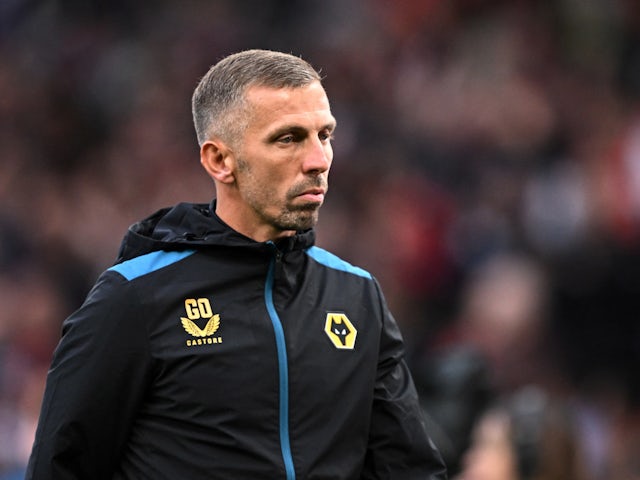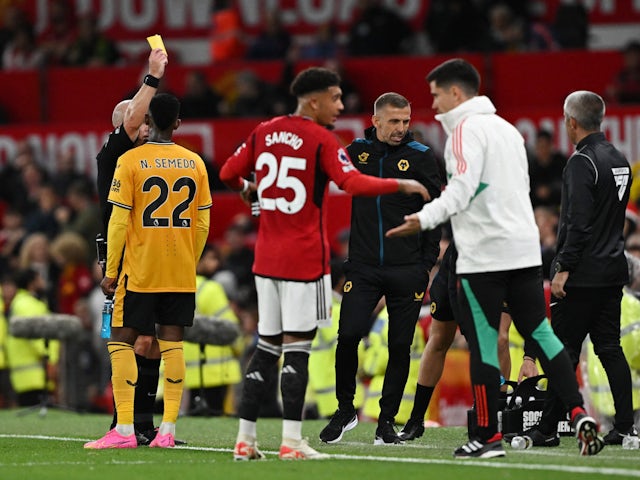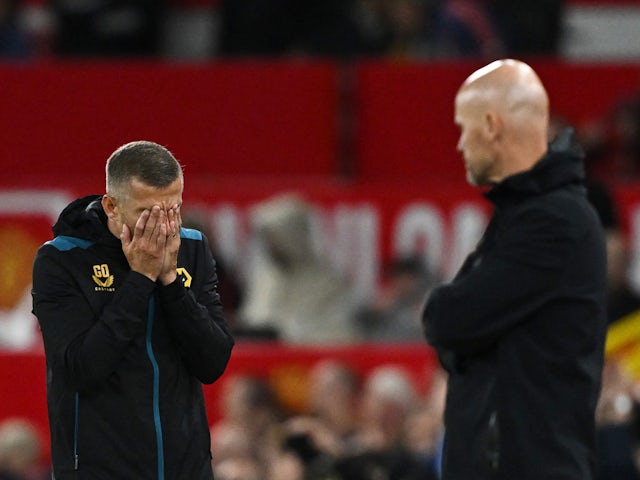If you are a Wolverhampton Wanderers supporter, you should have woken up this morning feeling a sense of optimism regarding a new era under Gary O'Neil. Having recorded the most shots on goal in a Premier League fixture against Manchester United at Old Trafford since 2005, there is a sense that people went too early with their reactions to the Englishman's appointment as head coach last week. However, their team, as they will insist with justification, were on the harsh end of another VAR call that seemed routine to make, not one that would become the talking point after matchday one.
Wolves are no strangers to having decisions go against them at the home of an English superpower. They started the year by being told that there was not a suitable camera angle available to prove that Toti Gomes's potential winner in an FA Cup tie at Liverpool was not offside. There are other notable examples - Max Kilman falling foul to a poorly-implemented handball rule at Leicester City in 2020 springs to mind - and Wolves themselves, albeit more sporadically, have benefitted themselves on occasions.
That said, the decision that cost them the opportunity to equalise from the penalty spot against United on Monday night needs to become a blessing in disguise, rather than Wolves, again with justification, having reason to feel that further big calls in such fixtures are going to go against them.
 © Reuters
© Reuters
The start of the new season has been awash with rule changes. Former referee Dermot Gallagher recently described it as "short-term pain for long-term gain" as the Football Association take action to prevent the relentless harassment of referees, and who can blame them?
From the grassroots to the very top, the governing body has a responsibility to protect its officials. Like in most walks of life, there needs to be a constant production line to preserve longevity, and the Premier League requires that as much as anyone in order for its product to remain regarded as the best. If younger people are watching referees get barracked each time that they watch football on television, they are going to be discouraged from turning up at parks around the country on a Sunday morning to try to advance a career that is never going to be universally popular.
From the behaviour that we saw from every Premier League club at some point last season, it had become clear that abusing and confronting officials had gone too far, to such an extent where, barring the Aleksandar Mitrovic incident, the player always seemed to remain in the right.
Liverpool defender Andrew Robertson had repeatedly used a certain f-lettered expletive to talk to assistant Constantine Hatzidakis during a fixture with Arsenal towards the back end of the season, an action which undoubtedly contributed to Hatzidakis inadvertently catching Robertson with his elbow as he tried to prevent the player from again bombarding him with criticism at half time. Yet it was the official who felt obliged to apologise.
It was further evidence that football had lost its way - its respect - for people and human beings that are putting themselves in the firing line to keep a sport that they love ticking over. Referees and assistant should always feel in a position of power, regardless of the sport, but the consequence of them appearing weak in 2022-23 has led to them being provided with the freedom to run amok with the superior control that they have in 2023-24.

While the FA's tinkering was well-intended, their decision-making over the summer has led to a concoction of power-hungry referees who are needing no second invitation to punish dissent and perceived time-wasting, yet have lost sight of how to make the big decisions. Add in an extra mixer of VAR officials being petrified about when or when not to provide their assistance, and the end result is the hangover that football, and in particular, Wolves would have felt heading into their recovery sessions at their Compton training ground on Tuesday.
The decision to award O'Neil's side a penalty should have been simple. Man United goalkeeper Andre Onana misjudged the flight of a cross delivered to the back post and collided into Sasa Kalajdzic. Regardless of Simon Hooper not sufficiently seeing the incident or not, it should have taken one look at the footage that was provided to VAR for an overrule to be made, yet the clouded interpretation of tolerance levels over 'clear and obvious errors' unnecessarily complicated a process that required minimal thought.
Hooper and the VAR team in question have since been dropped from the fixtures on matchday two, with Wolves also receiving what is effectively a pointless apology.
Should Wolves have had a penalty? 😬 pic.twitter.com/U2v3fnHhDM
— Sky Sports Premier League (@SkySportsPL) August 14, 2023
This is the fourth year of VAR being used in the Premier League and a bullet-proof system has still not been established to prevent refereeing errors from being eradicated from what is supposed to be the best league in the world. There has always been the 'letter of the law' and subjectivity, but neither should be relevant in this case.
The FA and VAR have become obsessed with the 'clear and obvious error' ruling because they generally do not want to be seen undermining a colleague. We should also not ignore the decision to award Luton Town a spot kick versus Brighton & Hove Albion for a handball given against Lewis Dunk, VAR failing to overturn the call of penalty made by the on-field referee when the ball inadvertently hit the defender's trailing arm.
Reversing back to the issues of dissent and time-wasting, O'Neil was handed a yellow card - which cannot be rescinded - for complaining about the non-penalty award, and Rayan Ait-Nouri was cautioned for time-wasting in the 35th minute in a game that Wolves were trying to win, just like Trent Alexander-Arnold was for Liverpool against Chelsea on the previous day.
Officials have been instructed to show zero-tolerance, yet, in doing so, are losing their understanding of situations. Each one is different. There cannot be a blanket rule to punish players who dwell a few seconds over a throw-in - as was the case with Ait-Nouri and Alexander-Arnold - when it is dependent on the options in front of them.

The amount of time that the ball is in play is an issue, granted, but the FA and Premier League are ready to sacrifice quality for entertainment. If a rushed throw-in leads to a goal for the other side, it leads to further eyeballs on social media and excessive dissecting with pundits, because players are being put in no-win scenarios. The FA has ultimately gone on a summer power-trip to regain some sense of authority, yet they are at greater risk of devaluing a division through enforcing a range of measures that, if maintained, will strip it of the emotion and clarity in decision-making that should be achievable hand-in-hand.
Where they go from here is anyone's guess. The argument is that we are early enough in the season for the decision-makers and Premier League clubs to convene and make amendments to rules that will not stand the test of time. The FA wants everyone to adhere to their regulations, yet in their current form, they can only be described as farcical. On the other hand, what happens if the sometimes-erratic Wolves goalkeeper Jose Sa commits a similar foul to Onana against Brighton on Saturday?
Although you can argue that officials are effectively caught in the middle of a row between a governing body and the participants of one of the sport's centre-pieces, they also have the ability to instigate a change in perception of their own roles. Aside from the Ait-Nouri and Onana incidents, as well as bizarrely failing to book Aaron Wan-Bissaka for numerous blatant fouls, Hooper actually had a solid game.
But mistakes lead to tarnished opinions and a lack of faith results in extra pressure, and it inevitably becomes a vicious cycle. That is where we are at right now, and will stay, unless the FA shows the fortitude to backtrack on their recent introductions.
No Data Analysis info








